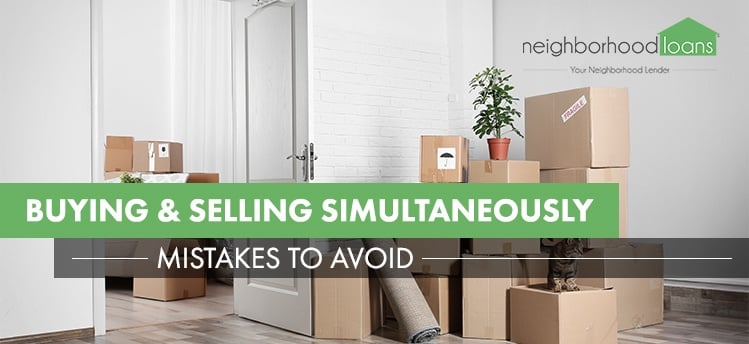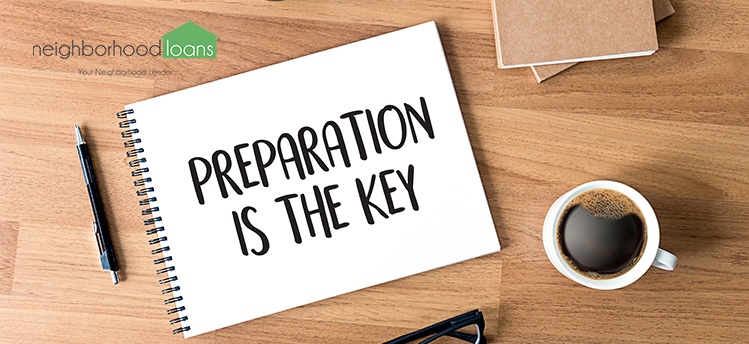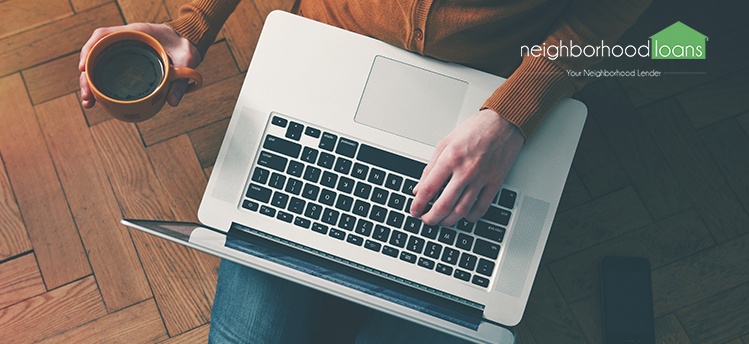TOP 9 Mistakes to Avoid When Buying and Selling Your Home Simultaneously

Buying a new home is exciting, right?
You get to redecorate the space, create new memories and start a new chapter in life.
In contrast, selling a home can be exciting news, too!
You have the opportunity to start fresh, clean out the clutter and relocate to something better.
However, when you are buying and selling homes simultaneously, things can get tricky.
Both transactions require a great deal of attention and planning. If you are not careful, there is a higher probability that something can go wrong.
To make sure this transition goes smoothly, check out these top 9 mistakes to avoid.
Moving on the same day

It may seem logical to close on both homes on the same day.
However, this is not a smart move.
This can cause many complications on either end. Being one person, it’s impossible to be at two places at once.
If your attention is needed at both homes, it can be tricky to balance out your priorities.
This can also cause delays. Closing and moving on the same day can develop problems that could be costly and take up a lot of time to fix.
To avoid this dilemma, do not schedule both homes to close on the same day.
Sell your old home first, then spend a few nights at a friend’s house or hotel until your move-in day.
This way, you can focus all of your attention on one house instead of being forced to split time equally.
With this approach, you will be able to resolve any issues and make the impossible, possible.
Not considering moving or selling first
Before packing up boxes, it is important to consider whether you should buy or sell the home first.
Both approaches have their pros and cons, which raises a vital question of how you should handle this transition.
Selling your old home first makes getting a mortgage for your new home easier.
Since your old mortgage no longer needs to be paid for, your finances are intact.
However, you will need to find temporary living before your move-in date. In addition to finding extra storage space for your belongings.
On the other hand, buying the new home first makes moving in easier.
You will be able to move your belongings in without requiring storage units or your friend’s garage.
But, your debt-to-income ratio will be affected, which makes it harder to qualify for a new mortgage loan.
Not to mention, the difficulty and stress added when you are paying for two monthly mortgage payments at once.
Before you list your home or start touring properties, consider selling or buying first and figure out which one seems more logic.
Agreeing too much

Don’t just say “yes” to speed up the process.
Although it’s an impulse reaction to willingly agree to get to the finish line faster, this could potentially hurt you.
Sometimes, buyers or sellers will change something last minute and assume you will agree.
You need to be 110% sure you are OK and comfortable with what you are agreeing to. If you end up blindly agreeing to things, you could be taken advantage of by the other party.
Be mindful and alert of what the other party is proposing. This transaction should benefit both sides without causing issues.
If you are not comfortable with what is being offered, it is OK to disagree or make a counteroffer.
Buying and selling a home is a delicate process that should satisfy you completely.
Expecting there won’t be any problems
Never assume things will pan out perfectly.
In life, you can almost guarantee there will jumps and obstacles to overcome.
Especially when you are buying and selling a home at the same time. Problems, big or small, can occur prior to closing.
When you acknowledge that this process may not be as smooth as you hoped, you will be able to adjust and adapt to the changes easily.
For example, your closing date could get pushed back, sellers could back out of the deal or your credit score could change, therefore, jeopardizing your loan.
The bottom line: expect the unexpected.
With this mentality. you will be able to navigate your way through these problems and complete both of your transactions with little setbacks.
Not having a back-up plan

It is important to have a backup plan for when things don’t go as planned.
As mentioned before, buying and selling a home is a delicate process and many things could go wrong.
To avoid scrambling and figuring out new plans, be prepared and have one, or several already drawn up.
This will help you keep your stress levels down and you will know how to approach the problem easily with little time wasted.
Most of the time, transactions are completed with little to zero complications.
However, problems can still occur, such as your move-in date is pushed back or the moving services cancel last minute.
What do you do?
To be on the safe side, it’s best to have a plan B, C and D, just in case.
Having these preplanned alternatives can help you approach the problem quickly and swiftly.
You can ask your realtor for tips and suggestions on how you can delegate and create plans so this transition can go smoothly.
Buying expensive things before closing

Although it’s tempting to buy new furniture to match your new home’s theme, avoid purchasing expensive things before closing.
Unless you are paying with cash, it’s best to wait until you have paid off your credit card bills and regained financial stability.
Financial experts encourage buyers to wait to buy furniture until after closing because new debts can negatively affect your credit score.
If you plan on using your credit card, new expensive purchases or new lines of credit can hurt your credit score, which could delay your ability to close on your home.
Buying a home is a huge investment with your time and money.
You don’t need to add to your current debt value by carelessly purchasing extravagant and pricey items, such as new furniture, a new car or hiring contractors to remodel.
These purchases and inquires can be quite expensive.
Which is why it’s best to wait a few months after closing so you can regain financial stability and learn more about the home.
Then, you can prioritize what rooms need new furniture and features, so your home can really come together.
Assuming the deal is done
Although you have a contract written up on both places, do not assume it is a done deal.
It is commonly believed once you have a contract in motion, the deal is sealed.
This couldn’t be further from the truth.
Until the contract has been signed at closing is when the deal becomes official.
Contracts have the potential to break, this can happen if one party backs out, mortgage loans are not approved, or the home’s appraisal report was not up to standards.
If you jump ahead to this mentality, you will have a hard time adjusting when things don’t go according to plan.
Most of the time, if you are careful, these plans follow through to closing.
Closing day may be one of the most important days of your mortgage process, which is why it’s important to know exactly what happens.
To be on the safe side, do not assume the deal is done until contracts have been signed.
It would be heartbreaking to come to terms that this deal is no longer happening and you are forced to find a different outcome.
Don’t risk the heartache and wait until the deal is finally sealed to celebrate.
Not having a bridge loan
A bridge loan’s purpose is to help pay for both mortgages while buyers are selling their previous home.
These temporary loans are provided by the bank to bridge the gap between the sale price of the new home and the home’s new mortgage, even when the buyer’s home has not sold yet.
Bridge loans are common for people selling and buying home simultaneously.
Typically, a bridge loan’s funds are used for the down payment for the second home.
Lenders are able to approve buyers on two payments because of the following:
Most buyers already have an existing mortgage on their present home; the buyer will close on the new home purchase before selling their previous property; and for a short period of time, the buyer will own two homes.
Bridge loans offer several benefits for the buyer, for example, the buyer can immediately put their home on the market without limitations.
Bridge loans also have the potential to delay monthly payments for a few months. This allows the buyer to catch up on their finances and settle into their new mortgage payments.
If you are in the market to buy a home but currently own one, consider using a bridge loan to help transition your finances in a clean and straightforward way.
Or, pay a visit to Neighborhood Loans and learn about the different loan options we offer for homebuyers and owners like you!
Not being proactive

If you are not proactive during this process, you can end up hurting yourself.
You need to do your research before buying the home.
Meaning, have the home inspected, request an appraisal, evaluate the neighborhood, look at comparable homes and about a few hundred of other things.
Certain details like the quality and proximity of local stores from your desired neighborhood is important to consider. Although sometimes it is overlooked, when you buy a home, you also buy the neighborhood.
Buying a home is one of the biggest investments of your life. You don’t want to spend a fortune and then some on a home where you will not be happy.
Do your due diligence and research the property from its base to its roof.
This is extremely important especially if you are moving to a different state.
Sometimes during this transition, it is hard to find a time to physically examine the home in person.
Be aware and knowledgeable about the home’s interior, exterior, neighborhood, amenities, taxes and more.
It is crucial to educate yourself on these factors before making your move.
You need to know exactly what you are dealing with, whether you are moving down the street or across the country.
Use this helpful guide on the top things you should look for when buying a home.
Being proactive will keep you ahead of the curve and benefit you in the long run.
